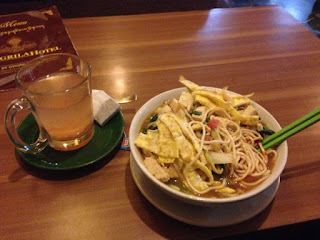Dharamshala/McLeod Ganj
After a week of yoga and Ayurvedic healing (among other things), I left Rishikesh on (another) overnight journey, this time to Dharamshala. It turns out that there is a bus that leaves Rishikesh daily at 4pm for Dharamshala, arriving somewhere around 6 or 7 am. It's a harrowing ride through the foothills of the Himalayas (which would be considered mountains almost anywhere else), in the dark, on narrow, windy roads, along steep precipices, at speeds which always seem just a little too fast (there's a reason why so many drivers in India have a little statue of Ganesha--the god who is the remover of obstacles--on their dashboard). The bus itself was deluxe by Indian standards--we all had our own seats, which also reclined. But the brakes screeched loudly and the tires squealed relentlessly around each curve. And there were ALOT of curves. And even though, at some point, I had given myself over to releasing control over the situation (I had to trust it would all be fine--because looking out the window and thinking about the drive wasn't going to change the outcome of any of it anyway), I was still jolted out of a teetering doze every few seconds or so by an extra loud screech or an extra long squeal. The honking, well, that just become part of the scenery.
But arriving in Dharamshala (McLeod Ganj more precisely) was a blessing--and in so many ways. I met a group of young people (in their 20s) from England, Sweden, and Chile, on the overnight bus and we spent some time together hiking and at HHDL's teachings, and for a few meals. I also met some travelers from India. One couple, who now live in Qatar, explained to me their unusual relationship status--that is, that they were dating without arrangement by their parents. And the woman was the oldest daughter and not yet married (at over 30). I also met a group of young men from Delhi while I was on a hike with my new friends from the overnight bus. We spent a nice long afternoon tea and snack in a hillside "cafe." I learned about what this particular group of men thought about "Englishers" and the relationship between their present and the colonial past of India.

Fellow Travelers on the Path! (Including the dog, who travelled with us a couple of hours on our pretty rocky and steep hike.)

Friends from the overnight bus ride on a hike in the hills above McLeod Ganj (which is already about 2,000+ meters-or 6,800 feet).
Loving some Tibetan food in McLeod Ganj.
In addition, I had some really interesting interactions and conversations with the very kind Kashmiri brothers who ran the hotel I stayed in in Mcleod Ganj. I also met a Kashmiri man on one of my many walks to and from His Holiness' compound; I had several chats with him (and a cup of tea or two) about the relationship between Kashmiris and Indians. I also enjoyed several conversations with aTibetan monk (and his nephew who translated for us) and several other refugees from Tibet. I felt such a profound connection with those who I met in the shadow (or rather in the light!) of His Holiness the Dalai Lama's compound. And of course, the teachings and presence of His Holiness was, to say the least, inspiring and transformative. And another blog post...
Long live His Holiness the Dalai Lama.






